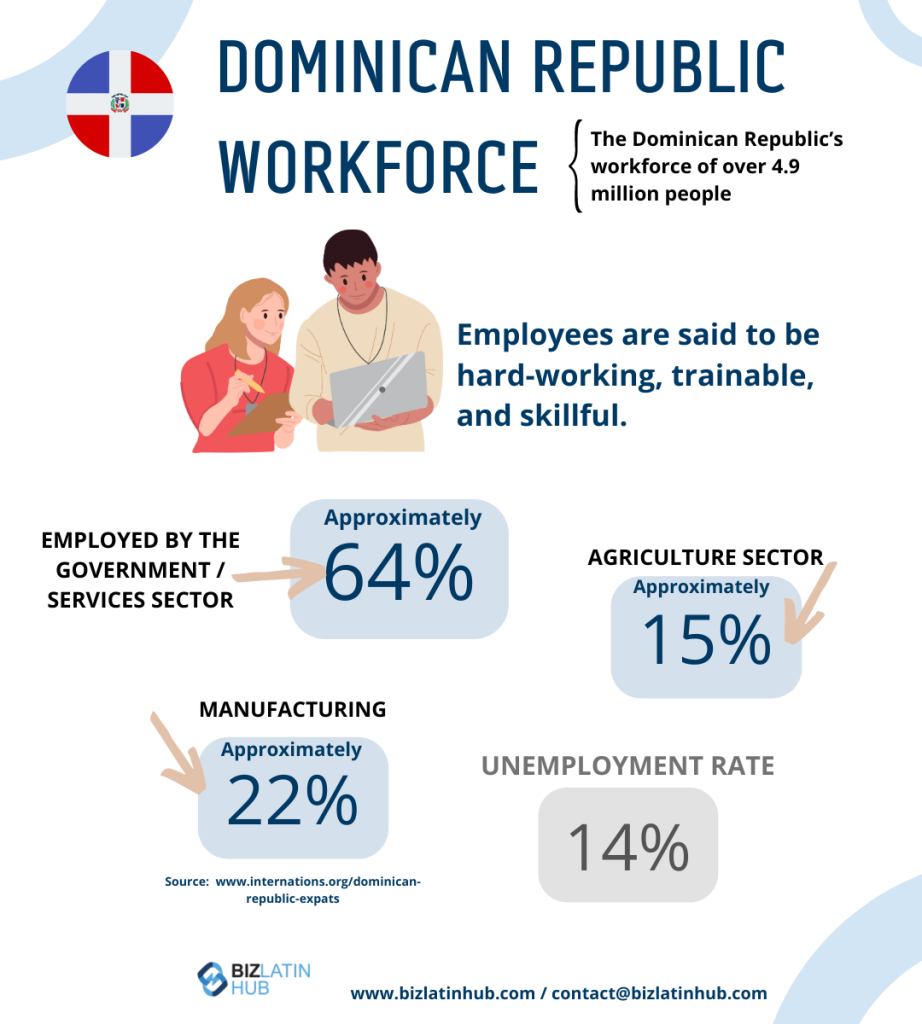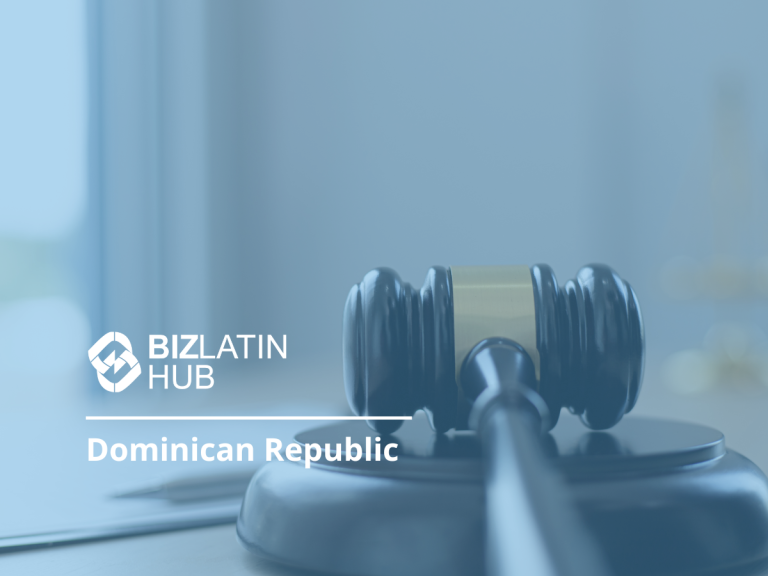Hiring new employees can feel overwhelming, especially in a foreign market. Companies looking to establish a presence in the Dominican Republic must navigate various hiring practices. Understanding local labor laws is essential for business success.
Dominican Republic has specific employment regulations, contracts, and payroll obligations. Knowledge of these aspects can significantly impact a company’s operations. Being informed can help businesses avoid legal pitfalls and foster a positive workplace.
This article provides a comprehensive guide to hiring in the Dominican Republic. It covers key topics such as labor laws, employment contracts, and strategies for effective hiring. Whether you’re hiring locally or remotely, this guide offers practical insights for your business.
Understanding Dominican Labor Laws
In the Dominican Republic, labor laws set a standard workweek of 44 hours. Overtime pay varies based on hours worked beyond this limit. Employers must adhere to a mandatory minimum wage, which differs by employment sector.
Employee benefits include paid annual leave and public holidays. Employers must also make social security contributions, covering health insurance and pensions.
Key Protections:
- Discrimination
- Unfair dismissal
These laws ensure workers’ rights are upheld.
Here’s a summary:
| Aspect | Requirement |
|---|---|
| Standard Workweek | 44 hours |
| Overtime Pay | Varies by hours worked above 44 |
| Minimum Wage | Sector-dependent |
| Paid Annual Leave | Mandatory |
| Public Holidays | Mandatory |
| Social Security Contributions | Health insurance and pensions |
This concise understanding helps both local and international employers comply with labor laws.
Employment protections are vital to fair treatment and workplace safety. Ensure these guidelines are followed for a harmonious work environment.
Overview of Employment Contracts
In the Dominican Republic, employment contracts establish the terms of work between employers and employees. The most common contract is the indefinite period employment contract. This contract continues until both parties agree to end it. All employment contracts for foreign workers must be in writing and registered with the Ministry of Labor. Foreign employees must have a valid work visa or legal residency. Contracts need to specify names, nationalities, marital status, addresses, and IDs of those involved. Written labor agreements are crucial because verbal contracts are not valid in court.
Types of Employment Contracts
The Dominican Republic’s labor laws recognize three main types of contracts:
- Unlimited Time Contracts: These are the most common contracts. They only end with mutual agreement.
- Limited Time Contracts: These contracts last for a specified period.
- Pre-Determined Work or Service Agreements: These contracts specify a task or service to be completed.
For foreign workers, contracts must be registered with the Ministry of Labor. They must also include details like working hours, salary, and termination conditions. Contracts must be in the employee’s language, and all salary details should be in Dominican pesos.
Key Elements of Employment Contracts
Employment contracts must contain:
- Names and surnames
- Nationality
- Age and sex
- Marital status
- Full addresses
- Identification numbers
Contracts should also include:
- Working hours
- Salary
- Benefits
- Termination conditions
The contract must be in writing for foreign workers and registered accordingly. It must also be in the employee’s language. Salary amounts should appear in Dominican pesos. Both parties must sign these contracts. They should detail roles, responsibilities, probation periods, and any termination clauses.
Overall, a well-drafted contract ensures compliance with labor laws and provides clarity for both employers and employees.
Taxation and Payroll Obligations
Employers in the Dominican Republic have specific taxation and payroll obligations. They must contribute 3.04% of the gross salary for Family Healthcare (SFS). There is also a Technical Education Tax of 0.50% on bonuses. Employers must deduct income tax and social security from employees’ salaries before payment.
Employer Contributions
| Type | Percentage of Salary |
|---|---|
| Family Healthcare (SFS) | 3.04% |
| Technical Education Tax (on bonuses) | 0.50% |
| Social Security Contributions | 7% to 12% |
The social security contribution varies between 7% and 12% based on the employment contract. These obligations include workplace safety and employee rights. Employers also need to provide proper training.
Key Points
- Understand all hiring costs: salaries, benefits, and payroll taxes.
- Ensure compliance with labor regulations.
- Handle payroll responsibly by making necessary deductions.
Meeting these requirements helps businesses manage budgets and comply with legal obligations.
Step-by-Step Hiring Process
Hiring employees in the Dominican Republic requires adherence to local labor laws. Employers must ensure equal treatment during the hiring process. This means prohibiting discrimination based on gender, age, race, religion, or disability. An Employer of Record (EOR) can help manage payroll and benefits, allowing companies to focus on business goals without setting up a legal entity. The typical working week is 44 hours over six days. Overtime must be paid at a higher rate according to labor laws. Employers can set a probationary period of one to three months to evaluate new hires.
Crafting Job Postings
When creating job postings in the Dominican Republic, it is crucial to outline requirements for a temporary residency visa and work permit for foreign applicants. Job postings should also emphasize compliance with local labor laws. Highlighting cultural understanding helps promote a harmonious workplace. Clearly state the benefits and bonuses your company offers. This information can attract skilled workers from both local and international markets. Mentioning the use of EOR services can simplify legal employment and compliance.
Application Screening Techniques
Effective application screening involves several steps. Employers often spend money on advertising and interviews, which are vital for screening candidates. Evaluate qualifications using selection methods that comply with labor regulations. Employers may need to budget for tools that aid in screening. Understanding employee rights is important for setting selection criteria. Efficient screening techniques reduce long-term costs, including training and severance pay.
Effective Interview Strategies
Interviews often begin with questions about the candidate’s background. Behavioral questions evaluate past challenges and problem-solving skills. Candidates should ask questions about the company to show interest. It is crucial to demonstrate respect and professionalism during interviews in the Dominican Republic. After the interview, candidates should send thank-you notes to express gratitude and interest.
Onboarding Best Practices
Onboarding starts promptly after hiring. The process may take just 1 to 2 days once required information is submitted. Companies focus on team integration with regular manager check-ins. Ongoing support includes mentorship programs and performance evaluations. Clear boundaries are set by reviewing and signing employment contracts during onboarding. A positive experience fosters employee engagement and belonging, crucial for their future within the organization.
Worker Benefits and Compensation
The Dominican Republic offers comprehensive worker benefits through its social security system. Employers contribute between 18.03% and 28.43% of an employee’s salary. These contributions cover retirement pensions, health insurance, disability coverage, and family allowances.
Paid Leave:
- Annual Leave: Employees receive 14 working days of paid leave, increasing to 18 days after five years of service.
- Maternity Leave: 12 weeks of paid leave.
- Paternity Leave: 2 days of paid leave on the childbirth day.
Sick Leave:
- Compensation: Social security covers 60% of wages after a 3-day waiting period for up to 26 weeks, based on employee contributions.
Mandatory Benefits:
- Medical Care: Employers must provide medical care and accident compensation.
- Public Holidays: Employees receive additional paid leave on public holidays.
This system ensures employees receive necessary assistance and protection. Employers must comply with labor laws to provide these benefits. This ensures workers’ well-being while promoting fairness in the workplace.
Paid Leave Laws and Regulations
Paid Leave Laws and Regulations in the Dominican Republic
Employees in the Dominican Republic enjoy specific paid leave benefits. After one year of continuous service, employees receive 14 days of paid vacation. This increases to 18 days after five years of service. Those who have worked less than a year earn one day of vacation for every 11 days worked. Once an employee completes one year, they earn vacation at a rate of one day for every 8.33 days worked.
Paid maternity leave is provided for female employees. They receive 14 weeks of leave, which can start up to seven weeks before their expected due date.
Public holidays also factor into paid leave. Employees are entitled to 13 public holidays, with paid time off on these days.
Here’s a concise summary:
- Paid Vacation:
- 14 days after 1 year
- 18 days after 5 years
- Accrual: 1 day/11 days worked (first year), then 1 day/8.33 days after
- Maternity Leave:
- 14 weeks paid
- Public Holidays:
- 13 days per year
These regulations ensure employees receive necessary rest and recovery time.
Termination Requirements
Termination Requirements in the Dominican Republic
In the Dominican Republic, employers can terminate employees for just cause like misconduct or poor performance. Employers must provide evidence for such dismissals. If terminating without cause, they must follow notice periods:
- 7 days for less than 3 months of service
- 14 days for 3 to 6 months
- 28 days for over 6 months
Severance pay applies if notice or just cause is absent. It equals 13 days’ salary for every 6 months of service. For over a year, it is 21 days per year.
The offboarding includes:
- Formal communication of termination
- Final wages and benefits payment
- Certificate of employment
Employers must comply with all legal requirements to avoid disputes. Consulting legal experts on Dominican labor law can ensure compliance.
Notice Period Table
| Service Length | Notice Period |
|---|---|
| < 3 months | 7 days |
| 3-6 months | 14 days |
| > 6 months | 28 days |
Always handle terminations carefully to align with labor laws and prevent unfair dismissal claims.
Advantages of Employer of Record Services
Employer of Record (EOR) services provide several advantages for companies hiring in the Dominican Republic.
Firstly, EOR services allow companies to hire employees without establishing a legal entity. This simplifies the onboarding process. By outsourcing employment responsibilities to an EOR, companies reduce risks related to local labor laws.
EORs offer a quick way to enter new markets and meet growth needs. Employees can start work in just a few days. Additionally, EORs give access to a broad talent pool in the Dominican Republic. This helps businesses find local expertise and skills.
EOR services also manage payroll, benefits, and tax compliance. This allows client companies to focus on core activities and strategic goals.
Key Benefits of EOR Services
- Speed: Quick employee onboarding
- Compliance: Adherence to local labor laws
- Focus: Time to concentrate on core business
- Talent: Access to local expertise
Overall, Employer of Record services streamline hiring processes and support business expansion into new markets.
Hiring Remote Workers: Considerations and Benefits
Hiring remote workers in the Dominican Republic offers many benefits. The country has a high literacy rate of 91.78% and strong government support for education. This makes it an ideal location for hiring IT, digital marketing, and customer service graduates.
The Dominican Republic has an internet penetration rate of 89%, which supports remote work. The cost of living is low, making hiring costs appealing for businesses. Employers need to consider local labor laws. Employment contracts can be indefinite-term, fixed-term, or predetermined.
Using an Employer of Record (EOR) can help businesses meet legal requirements. This simplifies hiring by ensuring compliance with labor laws.
Benefits of Hiring Remote Workers in the Dominican Republic:
- High literacy rate
- Strong tech focus
- Low hiring costs
- Multiple contract types
Considering these factors can help businesses make informed decisions.
Compliance with Local Employment Practices
Compliance with local employment practices in the Dominican Republic is crucial for businesses. Companies must ensure all employment contracts meet local labor laws. This includes proper employee classification. Engaging with an Employer of Record (EOR) can help. EORs manage payroll, taxes, benefits, and employment laws for the client. This lets businesses focus on their operations.
Companies are required to provide necessary training. This is part of their obligations under labor regulations. Engaging with EOR services reduces legal risks. EORs understand the local compliance landscape well.
For hiring remote employees, foreign employers must adhere to local rules. These include regulations for contracts, working hours, and paid leave. Compliance is crucial through every step of employment.
Essential Compliance Factors:
- Adhere to local labor laws
- Classify employees correctly
- Provide required training
EOR Services Offer:
- Payroll management
- Tax handling
- Benefit administration
Following these practices ensures legal compliance in the Dominican Republic.
Global Hiring Strategies for Dominican Republic
Hiring in the Dominican Republic can be streamlined through Professional Employer Organizations (PEOs) or Employers of Record (EORs). These services handle human resources, payroll, and taxes. This lets businesses focus on their primary goals. Establishing a legal entity is often costly and time-consuming, so PEOs or EORs help employees start work quickly.

Written employment contracts are important. They should include job descriptions, salary, working hours, benefits, contract length, and termination details. This helps prevent misunderstandings.
Key Points for Hiring:
- Work Permits: Ensure foreign workers have required permits and documents.
- Local Labor Laws: Understand local laws to protect both parties.
- Minimum Wage and Benefits: Stay updated on mandatory benefits and minimum wage laws.
Here is a summary of legal requirements:
| Requirement | Detail |
|---|---|
| Work Permits | Mandatory for foreign employees |
| Written Contracts | Recommended for clarity and legal safety |
| Labor Law Compliance | Essential for fair and lawful employment |
Understanding these factors aids in compliance and fair practices for all involved in hiring.
Cultural Considerations in Hiring
In the Dominican Republic, the hiring process values interpersonal skills, professionalism, and cultural awareness. Employers emphasize these attributes in assessing candidates. Job seekers prepare for interviews by researching the company and industry. This shows their interest and alignment with the company’s culture.
Employers prioritize reviewing resumes and job applications. They seek to understand candidates’ backgrounds and qualifications. This aligns with local cultural expectations. A structured interview approach helps assess candidate qualifications and suitability. This resonates with cultural norms.
Cultural nuances play a vital role. Candidates and employers must remain aware of local practices. Interactions during interviews reflect this cultural understanding.
Key Interview Preparation Steps:
- Research the company.
- Understand the industry.
- Align with organizational values.
| Key Focus | Description |
|---|---|
| Interpersonal Skills | Emphasized in interviews |
| Professionalism | Valued by employers |
| Cultural Awareness | Important for both parties |
Understanding these cultural factors is essential in the Dominican hiring process. Both candidates and employers benefit from being culturally attuned.
Frequently Asked Questions
What are the labor rights of employees in the Dominican Republic?
Labor laws in the Dominican Republic protect employee rights. Law No. 16-92 governs these rights. Employees work a standard 44-hour week. They receive higher pay rates for overtime, weekends, and night work. The law mandates a minimum wage by sector. This ensures fair pay for workers. Employees also get paid annual leave and public holidays. The law safeguards against discrimination or unfair dismissal. All workers receive equal treatment, regardless of gender, age, race, religion, or disability.
How do I ensure compliance with local employment laws?
Compliance with employment laws is crucial. Employers must give at least 28 days notice before terminating an employee. Severance pay is necessary for terminations without cause. This is based on service length and salary. Failing to comply can lead to fines, suspension, or imprisonment. Using an Employer of Record (EOR) can help manage compliance. The EOR handles payroll, employment contracts, and mandatory benefits. Drafting compliant employment agreements is essential. These documents cover salary, benefits, hours, and termination terms.
What should I know about employee benefits in the Dominican Republic?
The Dominican Republic provides comprehensive benefits. These include retirement pensions, health insurance, and disability coverage. Employers must give a minimum of 14 working days of leave. This increases to 18 days after five years of service. Maternity leave is 12 weeks, and paternity leave is 2 days. Mandatory social security contributions range from 18.03% to 28.43% of salary. Employees contribute 8.07%. Employers must also handle notice periods and severance pay. These depend on service length and termination reasons.
How can I effectively manage a remote workforce?
The Dominican Republic has a high literacy rate of 91.78%. This supports remote work in IT, digital marketing, and customer service. Employers must follow local employment laws for remote workers. These include various contract types. The internet penetration rate is high at 89%. This boosts connectivity for remote work. Employers should understand local severance laws. These offer compensation for discretionary dismissal based on service length. Providing competitive benefits helps retain remote employees. This includes pension contributions and optional private healthcare.
What are the labor rights of employees in the Dominican Republic?
Employees in the Dominican Republic enjoy several labor rights under Law No. 16-92. These rights ensure fair treatment and protection at work.
Work Hours and Pay Rates
- Standard Workweek: 44 hours
- Overtime: Higher pay rates
- Weekend and Night Work: Higher pay rates
Minimum Wage
- Varies by sector
- Ensures fair compensation
Leave and Holidays
- Paid annual leave
- Guaranteed public holidays
Protection Against Discrimination
- Equal treatment regardless of gender, age, race, religion, or disability
- Unfair dismissal protection
These rights foster a supportive work environment, contributing to employee well-being and work-life balance. Dominican labor laws promote fairness and equality in the workplace.




